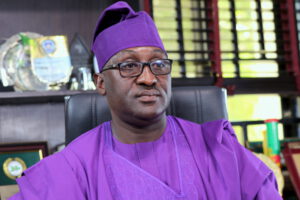By Idris Salisu
Minister of State for Environment, Sharon Ikeazor, has called for collaboration between the media and the Federal Government in sensitising Nigerians on proper management of e-waste.
Speaking against the backdrop of formulating an action plan for the Extended Producers Responsibility programme, the minister stressed the importance of the press in promoting facts, creating awareness and information dissemination.
Themed, “Extending Producer Responsibility Programme Under the Circular Economy: Tackling E-Waste”, the summit was moderated by former Director General of the National Orientation Agency(NOA), Dr. Mike Omeri.

Ikeazor: “On a daily basis, we can see the news that flood the media on the state of the nation, the economy, the environment and also mismanaged waste, which affects the environment as well.”
The minister went further to state that though the country has recorded big strides in the management of e-waste through the implementation of the EPR programme, there’s need to do more, hence the desire for a partnership with the media to create awareness in other to bring about a change in the ideology of the public towards effective environmental governance.
Also speaking at the event, the representative of the United Nations Environment Programme (UNEP), Mr Feng Weng, who spoke on “Circular Economy Approaches for the Electronic Sector in Nigeria,” disclosed that his organisation is working with the electronic sector in Nigeria, to redesign a system that will keep the value of the products and materials in the value-chain without polluting the land, oceans, rivers and air.
He further disclosed that GEF and UNEP were bringing international experience to the management of e-waste and providing inspiration in the advancement of policy work, thus positioning Nigeria as a role model for other African countries.
The project which started in June 2019, will last for another two years, he added.
The UNEP representative further explained that the major components of UNEP’s work is providing support to the Ministry of Environment and the National Environmental Standards and Regulations Enforcement Agency (NESREA), to implement the EPR Policy and System, support government to enforce legislation by providing more detailed technical guidance and supporting the private sector to establish and manage a collective system to collect and treat e-waste.
Weng said the international aid organization also plans to, “collect 300 tonnes of different electronics from different channels and recycle them.”
Speaking on UNEP’s partnership with NESREA, he said it would assist in gazetting technical guidance for EPR, which will give a clearer framework target of how producers should be taking care of e-waste in very efficient ways.
The UNEP representative disclosed that Nigeria is one of the first countries in Africa that has introduced legislation on e-waste, including domestic EPR legislation, management, transpondary movement, control of import and the introduction of license for collectors and recyclers.
Contributing to the discussion, Mrs Ibukun Faluyi, an official of EPRON, enumerated the role of her agency in the implementation and value-chain management of e-waste.
In his keynote address, the Director-General of NESREA, Professor Aliyu Jauro, spoke on government’s role in the circular economy and the EPR framework.
He highlighted the provisions of the EPR project, which he said is being carried out in three waste streams (plastics, electrical electronics and batteries) and its benefits in the creation of jobs, contending that if properly implemented, the programme will solve the e-waste management problem in the country.
The last speaker at the summit, Lai Oso, a Professor of Communication at the University of Lagos, opined that the capitalist industrial system run by Nigeria seems to contribute largely to the environmental problems in the country.
He said that for any public initiative to succeed, it would need public support, hence the importance of the mass media in bringing about such collaboration.
“The media are important tools or instruments of the development process, especially in national development,” Professor Oso stated, while emphasizing that the media remains the main mechanism or social institution for the creation and dissemination of public information and knowledge.
He, however, expressed displeasure at the lopsided coverage of environmental issues in Nigeria, saying, “The environment and issues connected to it, do not attract regular media attention, unless there’s a problem. Media attention to the environment tends to be crisis or problem-driven.”
He noted that most stories on environmental issues are tilted towards assigning blames, while real environmental problems get little coverage